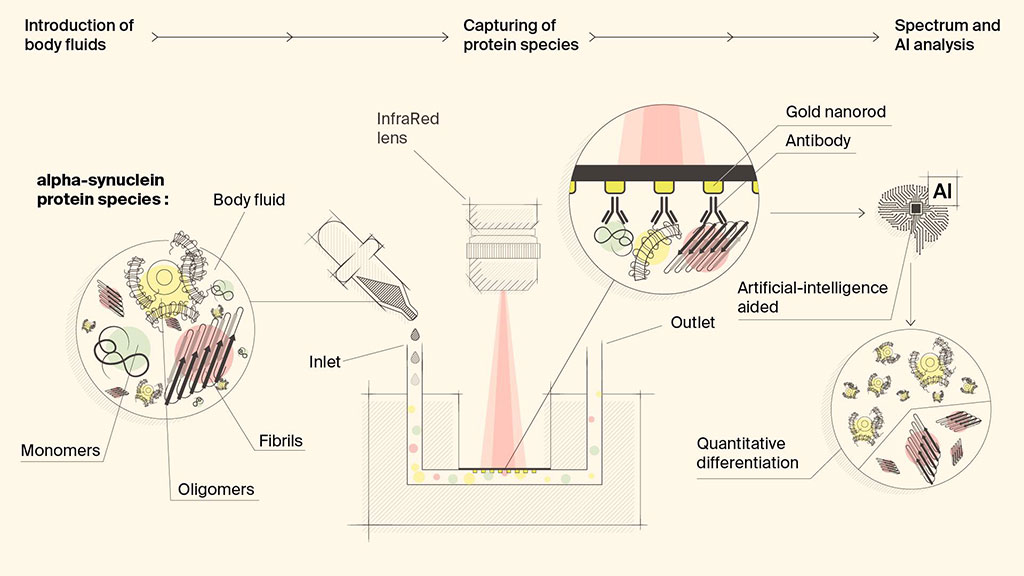Novel Biosensor Detects Neurogenerative Disease Proteins
Posted on 17 Jul 2023
The struggle to diagnose neurodegenerative diseases (NDDs), including Alzheimer's and Parkinson's, has primarily been due to the absence of reliable diagnostic tools for the early detection and tracking of disease progression. One main characteristic of neurodegeneration is protein misfolding, recognized as a significant event in the advancement of the disease. The theory is that in the initial stages, normal proteins misfold into oligomers and, in later stages, into fibrils. These misshaped protein aggregates circulate in the brain and body fluids, as well as accumulate as deposits in the brains of those who died from NDDs. However, the development of tools to identify these disease markers or biomarkers has remained unresolved until now due to various barriers, including the limitations of current technology to accurately distinguish and quantify different protein aggregates.
Researchers at EPFL (Lausanne, Switzerland) have now made a significant breakthrough in NDD diagnosis by combining multiple advanced technologies into a single system. This innovative system dubbed the ImmunoSEIRA sensor, employs biosensing technology to detect and identify misfolded protein biomarkers associated with NDDs. In addition, the system leverages the power of artificial intelligence (AI), utilizing neural networks to quantify disease stages and progression. This groundbreaking advancement offers hope for not only early NDD detection and monitoring but also for evaluating treatment options at different disease progression stages.

The researchers created this sophisticated NDD biomarker sensor by combining various scientific fields: protein biochemistry, optofluidics, nanotechnology, and AI. The ImmunoSEIRA sensor uses a technique called surface-enhanced infrared absorption (SEIRA) spectroscopy, allowing scientists to identify and analyze the structure of specific disease-linked molecules or biomarkers tied to NDDs. The sensor features a unique immunoassay to identify and capture these biomarkers with utmost precision. The ImmunoSEIRA sensor utilizes gold nanorod arrays with antibodies for precise protein detection and facilitates real-time specific capture and structural analysis of target biomarkers from minute samples. AI-driven neural networks are employed to identify the presence of specific misfolded protein forms - the oligomeric and fibrillary aggregates, providing an unprecedented level of detection precision as the diseases progress.
The EPFL researchers went on to demonstrate that the ImmunoSEIRA sensor can be applied in real clinical settings, i.e., in biofluids. They successfully identified the unique signature of abnormal fibrils, a key NDD indicator, even in complex fluids such as human cerebrospinal fluid (CSF). This study's results mark a significant leap in the domains of biosensing, infrared spectroscopy, nanophotonics, and NDD biomarkers. The introduction of the AI-assisted ImmunoSEIRA sensor is a positive development for early NDD detection, disease monitoring, and drug efficacy evaluation, fulfilling the urgent need for prompt intervention and treatment of NDDs.
“Since the disease process is tightly associated with changes in protein structure, we believe that structural biomarkers, especially when integrated with other biochemical and neurodegeneration biomarkers, could pave the way for more precise diagnosis and monitoring of disease progression,” said Professor Hilal Lashuel.
Related Links:
EPFL














